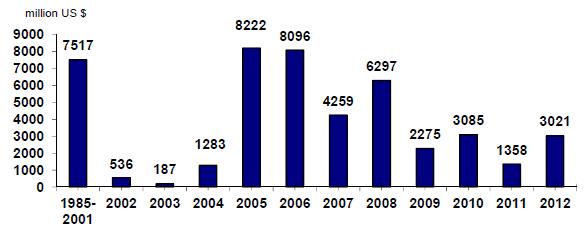the importation of goods from third countries with the EU’s common external tariff (from approximately 15% in 1995 to 4.2% in 2012) and to progressively adapt itself to the EU’s commercial policy and preferential trade arrangements with third countries. Although basic agricultural products were excluded from the initial package, a preferential trade regime for basic agricultural products was adopted as of January 1, 1998. Turkey is also progressively adopting many aspects of the Common Agricultural Policy of the EU and has taken substantial steps to harmonize its legislation relating to competition, consumer protection, intellectual property and standardization of foreign trade with those of the EU.
To adapt itself to the EU’s commercial policy and preferential trade arrangements with other countries, Turkey has signed Free Trade Agreements (FTAs) with all of the Central and Eastern European countries (Romania, Hungary, Lithuania, Estonia, the Czech Republic, Slovakia, Bulgaria, Latvia, Slovenia and Poland), Israel, Macedonia, Croatia, Bosnia-Herzegovina, Morocco, The Palestinian National Authority, Tunisia, Syria, Egypt, Albania, Georgia, Montenegro, Serbia, Chile, Jordan and the EFTA States (Norway, Iceland, Switzerland and Liechtenstein). Turkey signed FTAs with Lebanon, Mauritius and South Korea, which will enter into force after the completion of the ratification process. With the EU enlargement in May 2004, January 2007 and June 2013, Turkey’s free trade agreements with acceding countries have been terminated. The FTA with Syria was suspended on December 6, 2011.
FTA negotiations are underway with Ukraine, Colombia, Ecuador, Malaysia, Kosovo, Moldova, Democratic Republic of Congo, Ghana, Cameroon, Seychelles, the Gulf Cooperation Council (Bahrain, Kuwait, Oman, Qatar, Saudi Arabia, and United Arab Emirates), Libya, MERCOSUR (Argentina, Brazil, Paraguay, Venezuela and Uruguay), Moldova, Kosovo and Faroe Islands. Also, exploratory talks have been initiated with Canada, Japan, India, Indonesia, Vietnam, Peru, Central American Countries (Guatemala, El Salvador, Honduras, Nicaragua, Costa Rica, Panama), other African-Caribbean-Pacific Countries, ASEAN countries, Algeria, Mexico and Republic of South Africa.
With the completion of the Customs Union, the association between Turkey and the EU, as stipulated by the Ankara Agreement, had entered its final stage. At the European Council held in Helsinki in December 1999, Turkey was given candidate status. The recognition of Turkey as a candidate country ushered in a new era in Turkey-EU relations. The Accession Partnership for Turkey was approved by the Council on March 8, 2001. In response, the Turkish Government adopted its National Program for the Adoption of the Acquis (“NPAA”) on March 19, 2001. The Accession Partnership has since been revised three times on May 19, 2003, January 23, 2006 and February 18, 2008. Accordingly, Turkey’s National Program was revised in 2003 and 2008. Both the Accession Partnership and the NPAA are revised on a regular basis to take account of the progress that has been made and to allow for new priorities to be set.
In December 2004, following the EU’s decision to start accession negotiations with Turkey, the Government confirmed that it was ready to sign the Additional Protocol extending the 1963 Ankara Agreement to all the members of the EU prior to the actual start of accession negotiations. However, Turkey also placed on record that this would in no way imply a formal legal recognition of the Greek Cypriot Administration by Turkey. The Additional Protocol extending the Ankara Agreement to 16 EU member states was concluded by exchange of letters among Turkey, the Commission and the Council on July 29, 2005. Turkey also issued an official declaration, which constituted an integral part of its letter and signature, to the effect that the signature of the Protocol would not in any form constitute recognition of the “Republic of Cyprus” referred to in the said Protocol. Accordingly, Turkey stated that, pending a comprehensive settlement, its position on Cyprus would remain unchanged and expressed readiness to establish relations with the new Partnership State which would emerge following a comprehensive settlement in Cyprus.
The European Council of 2004 confirmed that Turkey fulfills the Copenhagen criteria which are a prerequisite for opening of the accession negotiations with Turkey. The Turkey-EU Intergovernmental Conference met for the first time on October 3, 2005, whereby the accession process was officially initiated. In parallel, eight sub-committees, which were formed in 2000 according to the EU acquis, periodically convene to review the developments that Turkey has achieved in related areas. So far, 14 chapters have been opened to negotiations5 On June 12, 2006, negotiations on Chapter 25 “Science and Research” were opened and provisionally closed by the Turkey-EU Intergovernmental Conference.
Although the screening process was completed in 2006, screening reports of 8 chapters6 are still pending approval by the Council, and the Foreign, Security and Defense Policy is still not prepared by the Commission.
______________ 5 | Free Movement of Capital-4, Company Law-6, Intellectual Property Law-7, Information Society and Media-10, Food Saftey, Veterinary and Phytosanitary-12, Taxation-16, Statistics-18, Enterprise and Industrial POlicy-20, Trans-European Networks-21, Regional Policy and Coordination of Structural Instruments-22, Science and Research-25 (provisionally closed), Environment-27, Consumer and Health Protection-28, Financial Control-32. |
6 | Free Movement of Workers-2, Fisheries-13, Transport Policy-14, Energy-15, Judiciary and Fundamental Rights-23, Justice, Freedom and Security-24, External Relations-30, Financial and Budgetary Provisions-33. |
15


